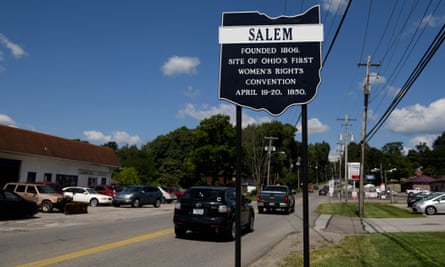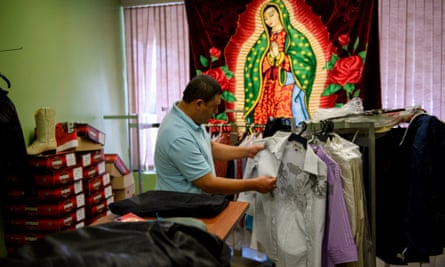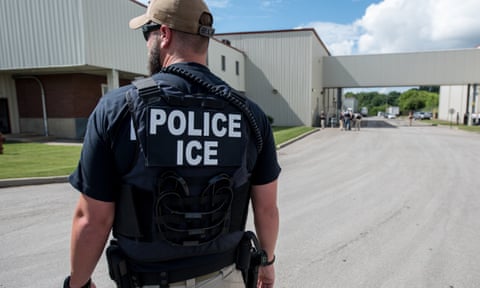Armed with guns and backed by helicopter air support, more than 100 US immigration agents swooped on the employees of Fresh Mark meat packaging plant on a summer day in the small Ohio town of Salem.
The huge raid on 19 June resulted in 146 arrests, most of them Guatemalans suspected of being in the country illegally, in a show-of-force raid that likely brought back violent memories of the militarized country many had fled years ago for new lives in America.
It was one of the biggest raids conducted on a workplace by the US Immigration and Customs Enforcement (Ice) in the past decade, and is part of a rise in such tactics under the Trump administration.
Yet three months later, for the residents of Salem on all sides of the immigration debate, it appears to have achieved little except leave visible scars on the community.
Many Guatemalan residents have left Salem, and those who remain refuse to speak about the raid with outsiders. Local businesses have suffered, churches and advocates scramble to help immigrants left traumatized and without jobs, and Fresh Mark continues operating, without its full workforce.

‘People are scared’
Surrounded by colorful packaged snacks, fancy cowboy shirts and posters for travel deals, a 19-year-old tended the counter at one of Salem’s Guatemalan stores as upbeat music played in the background.
Fresh Mark had been known as the only major employer in Salem that hired immigrants year-round. Since the raid, residents and advocates said many Guatemalans had left, or are planning to leave Salem, for other parts of the US, including the nearby Ohio towns of Dover, Canton and New Philadelphia.
“We’re throwing food out,” said the man, who insisted he did not want his name published for fear of attracting the attention of immigration agents. Since the raid, Salem’s Guatemalan stores have been hit particularly hard. “People don’t have work, people don’t have money, people are scared.”
He talks about killing, saying the word – in Spanish – over and over: matando. In his native Guatemala, people are killing each other, “too much”, all the time, he explains.
That’s why he left four years ago, making his way to this town of 12,000 people, and getting this job in this store on an inconspicuous corner downtown. The violence, related grinding poverty and government corruption, are the reasons Guatemalans have fled to the US over the past decades, and eventually settled in Salem by the hundreds.
Many joined relatives who had come before them, and found work in the Fresh Mark meat packaging plant just outside the town’s leafy historic district.
Other local businesses are feeling the loss in clientele. “Now it’s just one Hispanic person instead of 15, 20, 30,” said Emil Katano, an employee at the Circle K around the corner from Fresh Mark. “They bought a lot of hot dogs. We don’t sell as many hot dogs anymore.”
At a second Guatemalan store in Salem, young men said they were too afraid to talk about the raid, but immediately wrote down the name and number of a nearby church.

A sanctuary in Salem
Centro San Pablo, a community center run by St Paul church in downtown Salem, is a refuge for Guatemalan immigrants. Families wander in for help with bills, legal advice, or just companionship and moral support.
Founded four years ago as increasing numbers of immigrants arrived from Guatemala, Sister Rene Weeks was later hired to run it, after working for years in south-west Colorado and the rough Mexican border city of Juarez. Cities like Chicago and Los Angeles have scores of powerful non-profit immigrants rights and service organizations, but in small towns like Salem, it falls on churches to support and advocate for immigrants.
Immediately after the Ice raid, Centro San Pablo became a triage center for frightened Guatemalan families and area residents who wanted to help. Working with local police, child welfare employees and the labor union, within hours of the raid they had located all the children of detained immigrants, Weeks said, and brought them together in the church.
“The younger children didn’t know what was going on and thought it was fun, but it was scary for the older kids, scary for everybody,” remembered Weeks. By the evening most of the children were with family members, she said.
The day after the raid, the church held an evening service. Weeks thought Guatemalan residents would be too afraid to come, but about 130 people packed the church, about half immigrants and half English-speakers showing their support.
“That was a powerful witness to the fact that it’s one community,” she said. “People kept asking what they could do. We had volunteer translators, attorneys, people giving Walmart gift cards, people coming to play with kids, donating diapers – lots and lots of diapers.”
On a day to day level, Weeks explained, life does not look that different at San Pablo since the raid. Most of the same families come in.
But they are facing more extreme versions of the same challenges and anxieties they faced before: a struggle to earn a living, uncertainty over what their future holds and the looming prospect of deadly violence should they be forced to return to their home country.
Weeks and others who work with immigrants detained in the raid said that none of them are willing to talk to media, fearing scrutiny from immigration agents. A young man who works at another Guatemalan store said he has several uncles, cousins and friends who worked at Fresh Mark. He declined to give his full name, for fear attention could affect his pending asylum application. He said he knows people who have moved to nearby towns to work since the Fresh Mark raid, but returning to Guatemala is just not an option.
“People are afraid of being killed. And there’s no work,” he said in Spanish, while ringing up packets of cornmeal masa for two young men. “You can’t get good jobs there, and if you do, then the extortion starts. The government can’t do anything. My country depends on this” – immigrants in the US sending money home. “It’s a disaster, the fear and anxiety there is horrible. You feel like you are trapped and can’t escape.”

The jobs Americans don’t want?
Proponents of tough immigration enforcement like workplace raids see it as crucial to make sure that immigrants don’t fill jobs that unemployed Americans could do. That’s the viewpoint of Christopher Smith, a 42-year-old welder who lives about a mile from the Fresh Mark plant. He was thrilled to hear about the raid and rushed over in hopes he could voice his views on TV.
“There’s a lot of Americans out of work, and illegals are taking our jobs,” said Smith, whose front porch is adorned with faded red, white and blue bunting and a yellow “Don’t Tread on Me” flag. “When I was younger I crawled around picking beans and scrubbed toilets to support my family. Any American would do whatever they have to to provide for their family.”
Ed Lyons lives across the street from Smith. He worked at Fresh Mark and its predecessor, called Carriage Hill Foods, for 18 years. He remembers when Guatemalan residents began filling many jobs – “they were just flowing in.”
Lyons was making $13.45 an hour when he was fired in 2010 on what he describes as an unfair charge for leaving work before being dismissed, he said. He thinks he and other senior employees lost their jobs so that the company could replace them with immigrant workers earning less.
Lyons worked at Carriage Hill in 2001 when a human resources employee contacted immigration agents to complain that, she alleged, the company was falsifying social security cards and I-9 employment forms. She was fired and filed a whistleblower lawsuit, which she lost.
Lyons and Smith are among many Salem residents who dispute the idea that immigrants are doing “the jobs Americans won’t do”. They and others say there are plenty of “American” Salem residents who would work at Fresh Mark, especially if the wages were higher, and if drug tests didn’t eliminate numerous applicants in a town – like much of the American heartland – that is struggling with an opioid and methamphetamine crisis.
While Smith cheered the raid, he laments that it didn’t seem to have much effect.
“[Immigrants] will just be back there working again, they already are,” he said. “They need to raid every shift, not just one shift, and keep doing it.”

‘Voluntary departure’
Most of those detained in the June raid will likely not leave the US any time soon, given the backlog in the immigration process, and the fact that many of them have filed for asylum.
An Ice spokesman said he could not provide details on what had happened to the 146 people arrested in the raid. Some are believed to still be in detention, while a few have returned to Guatemala through “voluntary departure”.
But according to advocates and a labor union representative, most had been released from custody pending immigration proceedings, and some have even returned to work at Fresh Mark after filing for asylum, which gives them the right to obtain a work permit while the process proceeds.
Fred Jimenez of the Retail, Wholesale and Department Store Union (RWDSU) that represents Fresh Mark employees said he expects more people to return as their work permits are processed.
The company and workers were apparently targeted because of Ice’s suspicions that paperwork was falsified to facilitate the hiring of workers in the country illegally. A federal investigation of the company is ongoing. Ice said they can only comment on detainee cases by individual name, but that they could not release the names of the people arrested in the raid, or comment on the overall status of their case.
“Unlawful employment is one of the key magnets drawing illegal aliens across our borders,” said Steve Francis, HSI special agent in charge for Michigan and Ohio. “Businesses who knowingly harbor and hire illegal aliens as a business model must be held accountable for their actions.”
The company had participated in a program to cooperate with the government in verifying employees’ legal status, but that does not make it “immune from Ice scrutiny or prosecution,” said the agency in a press release. A Fresh Mark spokesperson declined to comment, citing the investigation.
Ohio has a backlog of more than 9,000 immigration cases that take on average 803 days to be resolved, the seventh longest average wait in the nation, according to the Trac database maintained by Syracuse University (updated through June 2018). That means many of those released after the raid could continue to work in US for years to come while their cases are examined.
Some have been working on the farms that surround Salem, but those jobs will end with the harvest. That means most of the workers detained in the raid will likely continue working somewhere in the US as they and their families spend several years in legal limbo.
Meanwhile, Fresh Mark appears to be struggling to hire enough employees to replace those lost, judging from interviews with Fresh Mark employees dashing into local convenience stores on their lunch breaks, wearing blue quilted vests or orange rubber boots.
“It’s a sprint-marathon, that’s what it is,” said a man who has worked there for more than 20 years, and declined to give his name since he said the company forbid workers from talking to media. “It’s gotten 50% harder since the raid. And we know day after day it’s going to be like that, because there just aren’t enough people.”

‘Like sitting ducks’
The air conditioning was broken in St Paul church on a hot Sunday afternoon in August; Father Bob mopped his face as Guatemalan families filled the wooden pews and Ruano handed out Spanish hymn books along with Karen Navyac, a retired elementary school teacher who spends countless hours volunteering at Centro San Pablo. She is learning to play guitar and sing Spanish religious and love songs.
Navyac’s family came to Ohio several generations ago – among the waves of European immigrants who populated the midwest. Salem, founded in 1806 by Quakers and named for “Jerusalem”, was an important stop on the Underground Railroad and part of the movement to abolish slavery. Slovak, Italian and other ethnic clubs still celebrate the town’s immigrant history.
Navyac gets teary-eyed when she talks about the raid and the hardship that has ensued for Guatemalan families: “Life is so hard anyway, we need to be taking away some of the pain that comes from just living, not making more pain for people.”
During the Spanish mass, Navyac joins Ruano in song as children cry and shriek playfully. To Salem mayor Joe Berlin, these children are part of Salem’s future, and their parents are an integral part of the community. He laments that they were “like sitting ducks” targeted in the workplace raid, and he hopes more of them get asylum and legal residency as a result of it.
“When I see a bunch of little kids with their mom walking down the street to the supermarket, it’s pretty nice,” he said. “It’s the American way.”
Dr Joe Shivers , superintendent of the Salem school district, said that after the raid school officials figured that come fall they might lose almost all their 128 Guatemalan students, with families moving, deported or afraid to send their children out in public. The district was struggling with how to redeploy their nine English-as-a-second-language teachers.
But when school started in late August, almost all of the students returned. He doesn’t know how long they will all be there given pending immigration cases and the difficulty of making a living in Salem for immigrants after the raid. In past years, he added, about 15 new Guatemalan students would start at Salem high school each fall, but this year there was only one.
He said he feels “gratitude” that most of the students are still here for the time being, and he hopes they get to stay.
“Salem is really a great place to be and we want to do everything we can to prepare these kids and adults to be lifelong learners and citizens here,” he said. “These are our kids now.”

